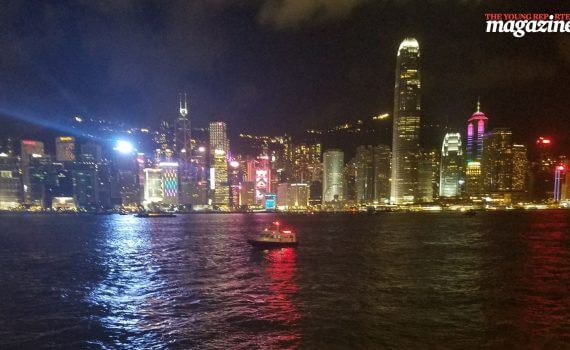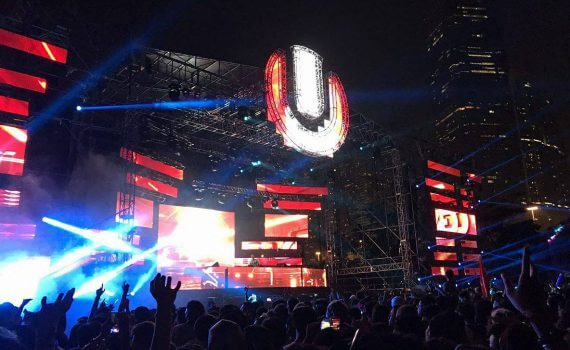#hongkong

A drive through the newly opened Wan Chai Bypass and Island Eastern Corridor
- 2019-01-21
- Society
- The Young Reporter
- By: Anna KamEdited by: Rachel Yeo
- 2019-01-21
The Wan Chai Bypass and Island Eastern Corridor opens today, costing $36 billion dollars to build. The project began in December 2009 and aims to reduce traffic from the eastern corridor towards the city’s central area, which has previously been a problematic area for traffic during rush hour. This is caused by drivers and passengers going back to the Kowloon side via the Cross Harbour Tunnel and surge of traffic going towards the Sai Ying Pun area from Causeway Bay. Passengers that go by the route from the eastern corridor to the west side often have a 30 to 45 minute wait between 5:00PM to 7:30PM. Roads have now been changed in order to accommodate the brand new tunnel. One of our reporters drove through the tunnel this afternoon, taking about 5 minutes to drive through the entire 4.5km tunnel, with generally smooth traffic. However, the final "test" that should occur would be during the rush hours in the morning and evening. During the drive, there were no clear instructions indicated on switching lanes within the tunnel was not allowed, giving the Wan Chai North (going to the Wan Chai Convention Center) only one lane, but three lands while heading out to the western side of the island. Despite the three lanes leading up to the western side, there was also no clear route that connects the Western Crossing harbour Tunnel since the exit is currently closed. One of the main aims of the tunnel was to divert the traffic from the Cross Harbour Tunnel to the Western Crossing Tunnel and the Eastern Harbour Crossing. However, the unclear instructions and unopened roads made it very difficult to get to the Western Harbour Crossing. Overall, the experience of driving through the tunnel was smooth, despite some minor changes in the directions and some exits of the tunnel remaining closed.

Hip-hop geeks leap forward with local rap battles
- 2017-10-26
- Culture & Leisure
- The Young Reporter
- By: Daisy Lee、Jianne SorianoEdited by: Daisy Lee、Jianne Soriano
- 2017-10-26
At eleven o'clock on Saturday night, when it's past bedtime for the city, the nightlife hub in Hong Kong's Lan Kwai Fong just kicked off its day. Standing at the entrance of an underground club, Hector "SCF-SAiNT" Telmo, in a plain black t-shirt with the words "Straight Outta Home Kong" was busily distributing leaflets for his hip-hop show held later night. Unlike others, he's looking for the chance to break the deadlock of hip-hop on the 'cultural desert' by organising regular rap battles in Central hipster clubs. Straight Outta Home Kong is a underground music project co-founded by two non-Chinese rappers, Telmo and Mohit "DJ Mojito" Kailandasani. Telmo has been stuck for a while in developing his career as a rapper. "Nobody opened the doors for us, nobody gave us opportunities. We felt like outcasts, so our mission was 'how do we bridge the gap, how do we connect, how we get to work with them,'" he said. Though the road to success is not as simple as he expected, the 25-year-old didn't stop. Instead, he started searching for way-out for his fellows—to connect Cantonese, English and Tagalog rappers, who were also looking for a place in the hip-hop industry for a long time. "Now that there's a platform, an opportunity and the fact that the younger generation can see this...at least they have something to look up to, especially on the ethnic minority side," he added. Invited by Telmo, Eric "Heartgrey" So, a Hong Kong beatboxer who debuted about 10 years ago, sees hip-hop battles held in bars as a chance 'to show [their] passion and energy to the local people'. "It's already hard to do music in Hong Kong so if there's a platform...why don't you perform and participate?" Describing the times when he was still starting as …

Two out of 40 prepackaged juices found to contain mycotoxin
- 2017-10-17
- Health & Environment
- The Young Reporter
- By: Holly ChikEdited by: Daisy Lee
- 2017-10-17
Consumer Council said two of prepackaged juices samples were tested positive for patulin, a mycotoxin a UN committee on Food Additives say could suppress immunoreactions, damage nerves and affect the development of infants. Although patulin is commonly present in decaying fruits, especially apples, "the risk is higher in juices because mould cannot be seen", said council spokesman Michael Hui King-man. The distributors have instantly removed the two cold pressed apple and blended apple juices, in which the amount of patulin have exceeded the Centre for Food Safety's action level. The council also found that the dietary fibre content of all 40 samples, including those with fruit pulps claims, was lower than the detection limit of less than 1.1g/100ml of fruit juice. Vitamin C content in apple juices was also found generally lower than 2mg/100ml, whilst that in orange juices, on the whole, was higher, ranging from 11 to 52mg/100ml. High sugar content in all samples also entailed that they are "not deemed as a low-sugar food" under Hong Kong's current nutrition labelling standards. For the sample with the most sugar, drinking 1 bottle of 360ml of juice would amount to 46g of sugar intake. In other words, it is equivalent to 92% of an adult average daily intake of 50g free sugars limit. The council urged consumers not to substitute fruit juice for fruit because juices contain less vitamin C and fibre but are more expensive. Reported by Holly Chik Edited by Daisy Lee

National day firework draws hundreds of thousands
- 2017-10-02
- The Young Reporter
- By: Raphael BletEdited by: Cecilia Wong
- 2017-10-02
As part of the 68th National Day celebrations, 31,888 pyrotechnic shells were fired from five barges in Victoria Harbour in the evening of October 1. The firework, which costs HK$13 million, lasted for 23 minutes. It is the most expensive firework since the city's handover in 1997. Despite the shower, people were seen flocking in until the very beginning of the ceremony at 8pm. Police estimated the number of attendees to 250,000 in Kowloon and 26,000 on the island. Crowd control measures were in place with the closure of numerous roads. The Marine Department issued special notices restricting maritime traffic and urged vessel owners to follow safety guidelines. Dozens of people gathered in Central in memory of the 39 people killed in the collision of two tourist ships bounding for celebration's firework in 2012. The worst maritime disaster in Hong Kong's modern history has prompted the authorities to issue specific guidelines on boats during fireworks. Some families have been demanding justice as the proceedings are ongoing. The flow of people took some time to disperse. Roads were cleared at around 10p.m. Reported by Raphael Blet Edited by Cecilia Wong

After Three Years, Sea of Yellow Umbrellas re-appeared in Admiralty
- 2017-09-28
- The Young Reporter
- By: Erin Chan、Michael Shum、Daisy LeeEdited by: Isabella Lo
- 2017-09-28
Convener of Citizen Charter 617 James Hon Lin-shan, also an organiser of the event, said more than a thousand people attended the commemorative rally of Umbrella Movement on Thursday - a double of what he expected. At 5.58pm, participants stood for three minutes of silence with their yellow umbrellas raised. Steam and sound were used to re-enact the scene at the exact time three years ago, when police started intimidating tear gases to force out the protesters. Around 40 parties and civil groups set up booths in the anniversary event. The three Occupy Central founders - Benny Tai Yiu-ting, Chan Kin-man and Reverend Chu Yiu-ming were among the speakers on stage. Tai said that people in Hong Kong should keep the faith in fighting for democracy. "No matter how the situation becomes, we should believe that Hong Kong can enjoy true democracy one day, " he said. The associate professor of law at the University of Hong Kong also criticized the government's suppression on discussions over Hong Kong independence. "Tell me why speaking about Hong Kong independence has violated the law? Which law I have actually violated?" Tai added. He also pointed out that the trio are all mentally prepared for the possible imprisonment. 'I believed once we have started the road of civil disobedience, we have to pluck up our courage to walk till the end, including being imprisoned,'' Reverend Chu said. The pro-democracy Umbrella Movement took place in 2014 was aimed to fight for universal suffrage to elect the city's leader and to resist the 831 framework proposed by Beijing. The 831 framework, laid down by the National People's Congress Standing Committee, set limits for 2017 Chief Executive Elections and 2016 Legislative Council in HKSAR, which involves screening of candidates and emphasizes the importance of a patriotic leader. …

60 anti-Japanese groups commemorate 86th anniversary of Mukden Incident
- 2017-09-18
- The Young Reporter
- By: Michael Shum、Erin ChanEdited by: Tracy Zhang、Daisy Lee
- 2017-09-18
60 anti-Japanese groups showed up in Central on Monday to commemorate the 86th anniversary of Mukden Incident which marks Japan's invasion in China. Organised by Hong Kong Federation of Trade Unions, groups including Association of Chiang Kai-shek - gathered outside the Exchange Square in response to Japan's development in military power. Social committee member of the Hong Kong Federation of Trade Unions, Kan Ming-tung urged Japan to face the history regarding the invasion of China on September 18, 1931. Kan said he felt regret that they were not allowed to enter the Consulate-General of Japan in Hong Kong and no representative from the office had accepted their letter.

Alleged drug found at venue of Road to Ultra Music Festival
- 2017-09-18
- The Young Reporter
- By: Erin Chan、Michael ShumEdited by: Angela Cheung、Daisy Lee
- 2017-09-18
One man died, two other men and a woman still hospitalised at Queen Elizabeth Hospital after collapsing at Hong Kong's Road to Ultra Electronic Music festival held last Saturday. Police found alleged drug during the investigation today at the Nursery Park in West Kowloon Culture District. Police said they found a small amount of substance- including one red and part of a light blue pill at the scene. However, they added that autopsy will be conducted later to confirm cause of death of the man. In response to the accident, West Kowloon Cultural District authority said they would discuss on how they can improve security checkups and relevant monitoring procedures at similar, large-scale events in the future. The authority stated that the four people had suffered from heatstroke. Some attendees were dissatisfied with the insufficient of water supply at the venue. The temperature was 32 degree Celsius on Saturday, while Hong Kong Observatory has raised ‘Very hot weather warning' to remind citizens the greater risk of heatstroke. Road to Ultra is an one-day electronic music festival held at Nursery Park, West Central Kowloon District last Saturday. According to the host, there were around 8,000 attendees on the event. Attendees had their bags checked at the security control of the festival. The organiser has set 15 house rules including strict prohibition of drugs. Spokesperson for Road to Ultra also added that there were around 100 security guards at the site to monitor the flow of the audience. There were three first aid booths to provide medical assistance. Four participants, aged between 21 and 29 collapsed at Hong Kong's Road to Ultra Electronic Music festival held last Saturday. They were all sent to Queen Elizabeth Hospital after the staff at the venue were alerted. One of the men, 27-year-old surnamed …



